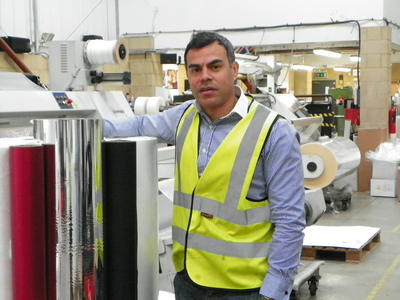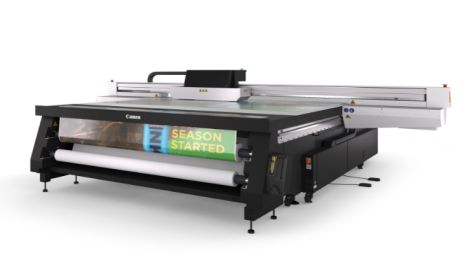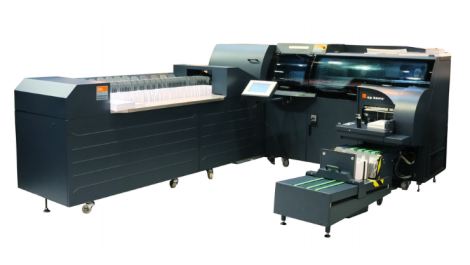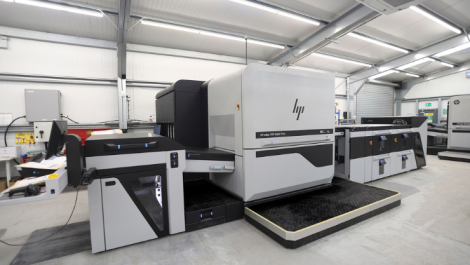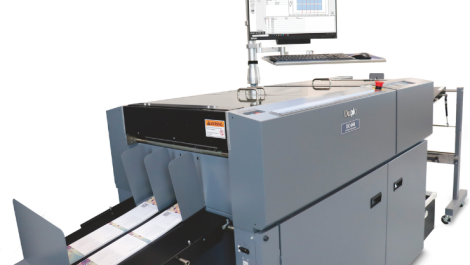Graphic Image Films is a specialist laminating film supplier, with a constantly evolving product offering that includes new thin films for digital printing.
After standard gloss, matt and silk laminating films, came soft touch and anti-scuff films, but there can be no standing still for Graphic Image Films (GIF). The dedicated laminating film supplier, based in Oxfordshire, has further new products up its sleeve, which it has shown at Ipex. These included black soft touch, metallised soft touch, red and blue metallic, and metallised silver gloss and matt films.
‘The growth as we see it is in new film finishes,’ Sandro Mosquera, Columbian-born sales & marketing director for the UK company, told Digital Printer. ‘We’ve been accustomed to standard gloss, matt, and silk; then two to three years ago we introduced soft touch and anti-scuff; now we need to bring it to the next level, with new products and finishes that will excite the printers and designers out there. That’s what we have been concentrating on in the last year or so.’
GIF is not a manufacturer, although it does have a converting operation at its site near Thame, where it stocks about 100 tonnes of film and can cut reels into different widths and lengths to meet many customer demands. It partners with leading laminating film manufacturers such as Derprosa of Spain, and Cosmo Films in India. Since it is also a dedicated laminating films supplier, it considers itself the expert in the field.
Among its UK client base of some 180 companies, things are changing. Many smaller printing companies, particularly in the digital market, are taking laminating in-house, putting pressure on specialist finishing houses. The machines being installed are often entry level or not much bigger, and this is having a profound effect on both the types of products GIF is selling and in the average order volumes it is dealing with, with more customers placing smaller orders.
Perhaps the most noticeable manifestation of this trend is in the products that the company offers for the digital printing market. The Digi-Stick range of laminating films made by Derprosa includes films as thin as 24 microns in gloss and 27 microns in matt. These have been developed as a direct consequence of the growing use of small laminating machines.
‘When we started to supply digital films a few years ago, 42 micron was the thinnest we did,’ Mr Mosquera continued. ‘We started to hear from clients that the film was not adhering to certain jobs. Some toner based print engines were causing a problem for the film. There are also a lot of small laminating machines going into the market and they don’t have the same capability of the bigger, automated machines – the heated rollers are not big enough to put enough heat and pressure on some of the thicker films to get through to the adhesive.
‘Digi-Stick introduced a 35 micron film, but we thought, what if we could develop a thinner film with a strong adhesive to make these accessible even for desktop laminating machines. The new thing now is 24 micron gloss and 27 micron matt. Everyone else is still supplying thicker films, but ours will work better with smaller machines.’
There are also 35 micron gloss and matt Digi-Stick films for those with larger laminating machines. Patience is still required to get laminating films to adhere to digitally-printed output however, with machines having to run slower, as well as the advisability of leaving jobs 24 hours post-printing before laminating and another 24 hours post-lamination. The several different printing technologies that make up the digital print market only complicate film development further. The fact that these constraints still exist is not through a lack of effort he said.
In the meantime, the focus is on bringing new finishes to the market, hence the black and metallised soft touch, and silver, red and blue metallic films now available. The silver metallised film is designed to give customers a BOPP alternative to Mirriboard. While these are all currently specialised films, the hope is that, like soft touch, they will become standard. In the pipeline for GIF are a gold soft touch film and an imminent move into the wide format market.
A combination of factors makes GIF a serious player, according to Mr Mosquera: ‘The overall package – quality and range of products, quality of service, converting, which is a huge selling point; the fact that we’ve got a dedicated technical person to assist on films and machinery; a competitive price level, and the fact that we dedicate ourselves to the supply of laminating films. We are a very specialised company.’
